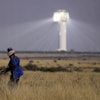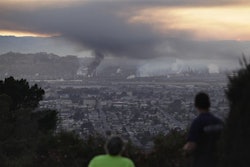EDMONTON (CP) -- A study says coal-fired power generation is likely to cause thousands of early deaths in Alberta before government regulations forces plants to reduce emissions.
The study also says the plants — many of which have decades to comply with new federal emissions rules — will also be behind thousands more hospital admissions and lost workdays. It concludes the cost of those health impacts amounts to a subsidy for generators because they don't have to pay for them.
"In essence, it's a health subsidy that's being picked up by the people of Alberta," said report author Tim Weis of the environmental think-tank Pembina Institute.
The institute teamed with the Canadian Association of Physicians for the Environment, the Alberta and N.W.T. Lung Association and the Asthma Society of Canada on the report released Tuesday.
Weis said if the health costs were reflected in the price of coal-fired power, renewable energy would look more attractive.
The study combined previous research measuring the health impacts of various pollutants with the known amounts of pollution coming from Alberta's many coal-fired power plants.
"There is an extensive body of literature dealing with the health impact of air pollutants," says the report, which draws on many studies from the U.S. and Canada on contaminants, including sulphur dioxide, nitrogen dioxide, mercury and particulates. The amount of those toxins released by each generator is published annually in a federal pollution inventory.
The groups also looked at the date at which each of Alberta's plants would come under tougher new federal regulations. Those rules say coal-fired power stations have at least 40 years after their construction before they are obliged to reduce their emissions to match those of natural gas-fuelled generators.
All the information was crunched together with other data such as the distance of each plant from major population centres to estimate the probable toll on the health of Albertans.
Using a model developed by the Canadian Medical Association, the report estimates that between 2008 and 2031, there will be just over 3,000 premature deaths from health impacts of coal-fired electricity. There will be more than 2,000 hospital admissions for the same reasons, nearly 10,000 visits to emergency wards and more than 100,000 instances of asthma sufferers having to restrict their activities.
Those impacts are a small fraction of overall hospital or emergency visits, but Weis said that shouldn't reduce their importance.
"That doesn't diminish the fact that those are real people going to real hospitals," he said. "Just because there's something worse doesn't mean we should not be looking at areas we know we can improve."
And those impacts do have a price.
Depending on how it's calculated, Weis said the health costs of coal-fired power will be between .7 cents per kilowatt-hour to 2.1 cents.
Weis acknowledged the conclusions are based on mathematical modelling.
"This stuff is hard to quantify and that can be an easy defence to hide behind," he said. "But we know that all of these pollutants aren't good for us.
"It's definitely complicated and you're always going to have error bars and ranges on these things, but what they all show is that there's a real cost that's not being internalized."
Weis notes that the health costs of coal generation calculated in his report are comparable to the one-cent Eco Energy subsidy that the federal government used to grant to renewable power sources.
He said given the health costs of coal-fired generation — not to mention the greenhouse gas emissions from such plants — power producers should consider choices such as converting to natural gas, which is much less polluting.
Although he hasn't done similar calculations for other provinces, Weis said the impacts of coal-fired power are almost certain to be higher in Alberta than anywhere else in the country, especially as other provinces such as Ontario phase out their coal-fired fleet.
"We burn more coal than anyone else," he said.






















